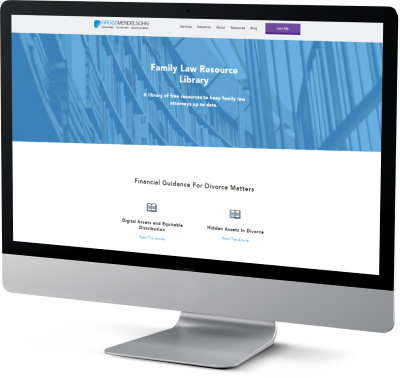More and more, divorce attorneys are finding that stock options are becoming increasingly popular forms of equity incentive compensation. And when considering stock options in family law litigation, the main concern is typically the distribution of cash proceeds.
However, the tax implications of various stock options should not be overlooked. For instance, your client may be awarded stock options in their divorce case, but that comes with additional income tax obligations. Or worse, your client may have to relinquish stock options in the division of assets, yet will still owe taxes on the relinquished stock options.
To avoid these surprises and better negotiate on your client’s behalf, here's a breakdown of what stock options are and the tax implications attorneys should be aware of when dealing with stock options in divorce.
Key Definitions
Before diving into the nitty-gritty details, here are some key definitions to help explain how the taxes tied to each stock option are calculated.
| Terms | Definition | Tax Bracket |
| Strike price or exercise price | The price at which an option holder may buy the stock | Not applicable |
| Fair market value (FMV) | Market price at a specified date | Not applicable |
| Alternative minimum tax (AMT) | An alternative calculation of taxable income — if AMT is greater than regular tax, the taxpayer will pay the additional tax | 26% or 28% |
| Capital gains rates | Preferential tax treatment for selling assets, like stocks, which have been held for over one year | 15%* |
| Ordinary income rates | Tax rates for more other income, like wages or stocks, which have been held for less than one year | 10% - 37%** |
Notes:
*Most capital gains will be taxed at 15% unless income is over $518,900 for single taxpayers in 2024— then they are taxed at 20%.
**Tax rate is 24% for single taxpayers earning over $100,525 in 2024.
What Are Stock Options and When Do Taxes Come Into Play?
Stock options provide buyers with the opportunity to purchase company stock at a discounted fixed price known as the “strike price" (see table above). If the price of a company’s stock stays above the strike price, the option holder would make money by selling the stock. Stock options are referred to as incentive compensation since the option holder is directly rewarded for their efforts in the form of a higher stock price.
Taxes begin to play a role in these options when one of the following events takes place:
-
Grant: Options are awarded
-
Vesting: Options have matured and can be used by the option holder (the company cannot relinquish the options at this point due to a change in employment since the options are fully owned by the option holder)
-
Exercise: Option holder purchases company stock
-
Sale: Stock is sold
What Types of Stock Options Exist?
There are two types of stock options to consider:
- Qualified/statutory stock options (ISOs)
- Non-qualified/non-statutory stock options (NSOs)
Traditional Stock Options
Among the traditional stock options, there are ISOs and NSOs. The differences can make a significant impact in cases of marital division.
| Features | Qualified/Statutory (ISOs) | Non-Qualified/Non-Statutory (NSOs) |
| Option holder | Only employees | Can be anyone |
| Transferability | Non-transferrable | Transferrable |
| Holding period | One-year holding period | No holding period requirement |
| Tax treatment | Capital gains rates | Ordinary income rates |
When Are ISOs and NSOs Taxable?
When an ISO is granted, vested or exercised there is no income tax due. However, when the option is exercised, the difference between the fair market value (FMV) and the strike price is added to the alternative minimum taxable (AMT) income. If the AMT income is greater than taxable income, then the AMT is triggered and the option holder will pay taxes on the excess AMT income.
When the stock is sold, after meeting holding period requirements, the difference between the strike price and current FMV will be taxed at capital gains rates.
| Type | Grant | Vesting | Exercise | Sale |
| ISOs | No tax owed | No tax owed | Potential AMT | Taxed on difference between FMV and strike price at capital gains rates |
In contrast, NSOs are taxed at the grant date only if the FMV is obvious. This is generally the case with publicly-traded stock. Otherwise, NSOs are taxable at the exercise date if there are no significant restrictions on the stock. The difference between the current FMV and the strike price is taxed at ordinary income rates.
When the stock is sold, it will be taxed at capital gains rates if the one-year holding period requirement is met.
| Type | Grant | Vesting | Exercise | Sale |
| NSOs | Taxed ONLY if FMV is obvious (e.g., publicly-traded stock) | No tax owed | Taxed on difference between FMV and strike price at ordinary income rates | Taxed on difference between FMV on exercise date and sale price at capital gains rates |
Benefits and Pitfalls of Traditional Stock Options
As with anything, there are pros and cons to ISOs and NSOs.
For ISOs, being subject to the AMT when the option is exercised can be harsh since the stock must be purchased and potentially taxed in the same year before receiving proceeds from the sale of stock. If the stock is sold in the same year it is purchased, then AMT will be avoided, but the gain will be subject to ordinary income tax rates, which are higher than capital gains rates.
On the other hand, NSOs are taxed at ordinary income rates, which are not preferential. But the stock can be exercised and sold in the same year to avoid owing taxes before proceeds from the stock sale are collected. This is a good option for taxpayers desiring a short holding period.
Section 83(b) Election
Within 30 days of exercising an NSO (if early exercise is available), the option holder can make a Section 83(b) election to pay taxes on the difference between FMV on the exercise date and the strike price at ordinary income rates. When this option is elected, any later appreciation in stock value will be taxed at capital gains rates rather than ordinary income rates.
| Type | Grant | Vesting | Exercise | Sale |
| NSOs with Section 83(b) election | Taxed on difference between FMV and strike price at ordinary income rates | No tax owed | Not applicable | Taxed on difference between FMV and exercise price at capital gains rates |
Benefits and Pitfalls With Section 83(b) Election
If the Section 83(b) election is made, the stock will be taxed at preferential tax rates when sold. By making the tax payments earlier, the amount of taxes owed will be reduced since later stock appreciation will not be taxed at ordinary income rates. But taxes will be due earlier than if the election was not made. This is a good option for taxpayers who expect to see the stock price grow significantly over a long period.
What Divorce Attorneys Should be Thinking About
In cases of spousal support, knowing what the tax burden may be and when the taxes are due plays an important role in ensuring the spouse receiving support will not be weighed down. Understanding whether stock options have been vested or exercised is crucial in making these determinations.
When negotiating an equitable distribution of marital assets, recognizing that not all stock options work the same way is key. Sometimes, the stock options can be divided but cannot actually be transferred between spouses.
In the case of non-transferrable ISOs, the spouse whose name is on the ISOs may be subject to the AMT when options are exercised. Both the AMT and purchase price would be due at least one year before the earnings from stock sales are received. When the proceeds are finally collected and distributed, the spouse holding the ISOs would have netted significantly less than a 50/50 split of the options. In this instance, the tax burden should have been considered when determining the division.
How to Determine Marital Portion of Assets
Before walking through the tax implications of stock options, the marital and separate portions of stock options must be determined. This can be cumbersome since there are several methods accepted by the courts in making this determination. To take a deep dive into the different methods, check out our blog, 6 Common Questions Attorneys Have on Stock Options and Deferred Compensation in Divorce.
Need Help?
Contact us here or call 800.899.4623.


